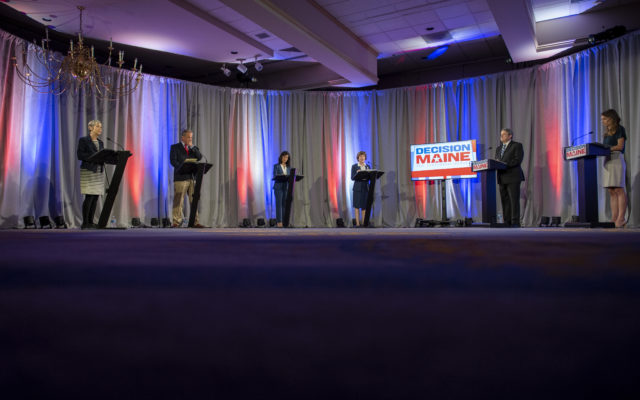
Susan Collins and Sara Gideon clash on leadership, money in politics in 4th debate
By Jessica Piper, Bangor Daily News Staff
U.S. Sen. Susan Collins and House Speaker Sara Gideon exchanged barbs on Senate leadership and money in politics in an otherwise restrained debate with independents Lisa Savage and Max Linn, the last featuring all four candidates ahead of the November election.
The debate, hosted by News Center Maine and the Maine State Chamber of Commerce, was held remotely. Collins participated from Washington, where the Senate is still in session, and Gideon refused to participate in person without the senator there. It is the fourth debate in the race and the final to include Linn and Savage. WMTW will host a debate with Gideon and Collins next week.
Gideon has maintained a narrow lead over Collins in public polling throughout 2020. The debate comes as more than 278,000 Maine voters have already successfully cast their ballots, a record level of absentee voting amid the coronavirus pandemic.
Both Collins and Gideon were asked about party leadership, with Collins taking a question about her support for Senate Majority Leader Mitch McConnell, R-Kentucky, who has advised President Donald Trump against passing a coronavirus relief bill ahead of the election. Collins, who has pushed for another stimulus bill, said she sometimes disagrees with him.
“I don’t hesitate to make my disagreements known,” Collins said.
Gideon, asked about whether she would generally support Senate Minority Leader Chuck Schumer, D-New York, and former Vice President Joe Biden if they were in charge of the Senate and White House, respectively, after the 2020 election, pivoted to criticizing McConnell on the issues, saying his leadership in the Senate puts the Affordable Care Act at risk.
The major-party candidates largely agreed on education and infrastructure, with both Collins and Gideon calling for improving rural broadband and working to make college affordable. Neither called for free college or abolishing student debt, which Savage and Linn both support.
Collins highlighted her role on the appropriations committee, which she would be in line to chair if Republicans kept a majority, and cited her ability to secure funding for Maine. Gideon questioned the effectiveness of that seniority, saying Collins had not been able to convince her Republican colleagues to join her in supporting another coronavirus relief bill.
The last major relief bill passed in March, including individual payments to families, extended federal unemployment benefits and the Paycheck Protection Program, which was co-authored by Collins and has provided $669 billion in forgivable loans to small businesses this year.
“If Senator Collins becomes appropriations chair, it means that Mitch McConnell is still majority leader,” Gideon said.
Collins hit back at Gideon for the Maine Legislature’s continued closure. Both parties in the Legislature agreed to shut down in March as the coronavirus closed in on Maine after passing relief bills. Lawmakers were unable to reach an agreement to return over the summer, with Republicans and Democrats differing on what the scope of a session should be.
The candidates were asked about money in politics, as the race has blown away previous records with more than $100 million in ad spending alone so far. Gideon, who has set fundraising records with more than $60 million raised, criticized corporate PACs and highlighted the importance of disclosure laws so the sources of money were clear.
Collins also criticized dark money while calling some of the attacks in the Senate race “disgraceful,” saying her opponents were distorting her record. Savage said the solution was for candidates to simply not accept large sums of money or run negative ads.
“Children now think that that’s what amounts to political debate,” Savage said.
In one segment, the candidates had the opportunity to ask each other questions. Savage, Linn and Collins questioned Gideon. Collins questioned Gideon on campaign finance, noting that, while Gideon has rejected corporate PAC contributions during her Senate campaign, her state-level leadership PAC took contributions from corporations.
Gideon said she stood up to special interests while working in the Legislature, and took her time to question Collins over her votes that helped advance key Republican priorities, including confirming Justice Brett Kavanaugh to the Supreme Court and voting for a Republican tax bill. Collins said she did not regret either vote and cited her record of bipartiship.
The four candidates agreed health care was a human right, though they proposed different solutions, all of which have previously come up in the campaign. Collins called for price transparency, while Gideon supports a public option and Savage supports Medicare for All and Linn has called for a hybrid system.
Gideon criticized Collins over Republicans’ efforts to repeal the Affordable Care Act, citing the senator’s 2017 vote for a tax bill that became the basis for a lawsuit against the landmark health care law though the Republican was a key vote in preserving the law that year. Collins was critical of Gideon’s proposed public option, saying it would create challenges for rural hospitals.
The Senate race will use ranked-choice voting. All four candidates said they would respect the outcome of a ranked-choice runoff.